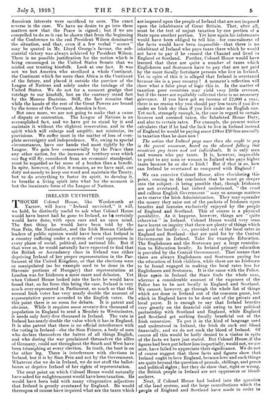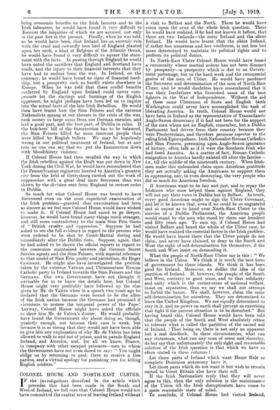IRELAND UNVISITED.
"HOUGH Colonel House, like Wordsworth at.
Yarrow, will leave " Ireland unvisited," it will, we hold, be distinctly useful to ask what Colonel House would have learnt had he gone to Ireland, as be certainly would have done, with open ears and an open mind. The first thing he would have been told by the Sinn Fein, the Nationalist, and the Irish Roman Catholic leaders of public opinion would have been that Ireland is a country suffering under a system of cruel oppression in every phase of social, political, and national life. But if that were so, he would naturally have expected to find that the British or Ascendancy class in Ireland was either depriving Ireland of her proper representation in the Parliament of the United Kingdom, or that the elections were so manipulated (as for example used to be done in the Slavonic portions of Hungary) that representation at London was for Irishmen a mere snare and-delusion. Yet when Colonel House looked into the facts he would have found that, so far from this being the case, Ireland is very much over-represented in Parliament, so .much so that the normal Irish voter has very nearly double the amount of npresentative power accorded to the English voter. On this point, there is no room for debate. It is patent and obvious. While it requires some seventy-five thousand of population in England to send a Member to Westminster, it needs only forty-five thousand in Ireland. The vote in Ireland has nearly double the value which it has in England. It is also patent that there is no official interference with the voting in Ireland—else the Sinn Feiners, a body of men who declare themselves the haters of all things English, and who during the war proclaimed themselves the allies of Germany, could not throughout the South and West have been triumphing at every election. In truth, the boot is on the other leg. There is interference with elections in Ireland, but it is by Sinn Fein and not by the Government. Whatever else we do in Ireland, we do not stuff the ballotboxes or deprive Ireland of her rights of representation.
The next point on which Colonel House would naturally have asked for enlightenment would have been taxation. He would have been told with many vituperative adjectives that Ireland is greatly overtaxed by England. He would thereupon of course have inquired what are the taxes which are imposed upon the people of Ireland that are not imposed upon the inhabitants of Great Britain. That, after all, must be the test of unjust taxation by one portion of a State upon another portion. Yet here again his informants would have been obliged to tell him—for concealment of the facts would have been impossible—that there is no inhabitant of Ireland who pays taxes there which he would not have to pay if he crossed the Channel and lived in England or Scotland. Further, Colonel House would have learned that there are quite a number of taxes which Englishmen and Scotsmen have to pay that are not paid by the more fiscally fortunate persons who live in Ireland. Yet in spite of this it is alleged that Ireland is overtaxed because she is a poor country ! A moment's reflection will show what a false piece of logic this is. In the matter of taxation poor countries may yield very little revenue, but if the taxes are equitably collected there is no necessary grievance. If you have got an income of 12,000 a year, there is no reason why you should pay less taxes if you live under an Irish sky than if you live under an English one. Yet such, strangely enough, is, the case in regard to certain licences and assessed taxes, the Inhabited House Duty, and also to certain rates. For example, the present writer calculates that if he had the luck to live in Ireland instead of England he would be paying some £40 or £50 less annually in taxation than he does now !
The notion that Ireland pays more than she ought to pay is the purest nonsense, based on the absurd fallacy that countries pay taxes and not individuals. It is only men and women who pay taxes. It is, however, impossible to point to any man or woman in Ireland who pays higher taxes because he or she is Irish ! But if that is so, how can Ireland be overtaxed as compared with England ?
We can conceive Colonel House, after elucidating this point, coming to the conclusion that he must go deeper into the subject—it being possible that, though Irishmen are not overtaxed, but indeed undertaxed, "the cruel and callous English Government" may so arrange matters as to starve the Irish Administration. They may squander the money they raise out of the pockets of Irishmen upon benefits and luxuries exclusively enjoyed by the people of England and Scotland. This of course is a physical possibility. As it happens, however, things are "quite otherwise" in Ireland. Colonel House would very soon have learnt on inquiry that there are plenty of things which are paid for locally—i.e., provided out of the local rates in England and Scotland—that are paid for by the Central Government in Ireland. Take for example Education. The Englishman and the Scotsman pay a large contribution to Education locally. In Ireland primary education is provided by the Central Government. That means that there are always Englishmen and Scotsmen paying for the education of Irish children, while there are no Irishmen to be found engaged in making the local rates less for Englishmen and Scotsmen. It is the same with the Police. Here again in Ireland the State finds the whole sum, whereas a considerable amount of the expenses of the Police has to be met locally in England and Scotland. We cannot, however, go through the whole list of things which are done in Ireland out of the common purse, but which in England have to be done out of the private and local purse. It is enough to, say that Ireland benefits very greatly on the financial side owing to her political partnership with Scotland and England, while England and Scotland get nothing fiscally beneficial out of the Irish connexion. To put it in the kind of language used and understood in Ireland, the Irish do suck our blood financially, and we do not suck the blood of Ireland. Of course all this would be hotly denied to a visitor in spite of the facts we have just stated. But Colonel House, if the figures had been put before him impartially, would not, we are sure, have failed to appreciate their significance. We do not of course suggest that these facts and figures show that Ireland ought to love England, because love and such things are quite beyond the question of pounds, shillings, and pence and political rights ; but they do show that, right or wrong, the British people in Ireland are not oppressors or bloodsuckers.
Next, if Colonel House had looked into the question of the land system, and the large contributions which the people of England and Scotland have made in order to bring economic benefits to the Irish farmers and to the Irish labourers, he would have found it very difficult to liscover the iniquities of which we are accused, not only In the past but in the present. Finally, when he was told, as he would have been, that Ireland lies an anaemic ruin with the cruel and cowardly iron heel of England planted upon her neck, a kind of Belgium of the Atlantic Ocean, he would have found it very difficult to square the statement with the facts. In passing through England he would have noted the sacrifices that England and Scotland have made, and the injury to their financial interests that they have had to endure from the war. In Ireland, on the contrary, he would have found no signs of financial hardship, but a prosperity such as hardly exists elsewhere in. Europe. When he was told that these sordid benefits conferred by England upon Ireland could never com pensate for the slayings and burnings of the English oppressor, he might perhaps have been led on to inquire into the actual facts of the late Irish Rebellion. He would then have learnt how the Sinn Feiners and the extreme Nationalists sprang at our throats in the crisis of the war, took money in large sums from our German enemies, and laid a good part, and the best part, of Dublin in ruins. If the butchers' bill of the Insurrection has to be balanced, the Sinn Feiners killed far more innocent people than were killed by English bullets. We may be hopelessly wrong in our political treatment of Ireland, but at any rate no one can say that we put the Insurrection down with bloodthirsty violence.
If Colonel House had then recalled the way in which the Irish rebellion against the Draft was put down in New York during the Civil War, he would have remembered that the Pennsylvanian regiments hurried to America's greatest city from the field of Gettysburg carried out the work of suppression with a great deal more fierceness than was shown by the division sent from England to restore order in Dublin.
So much for what Colonel House was bound to have discovered even on the most superficial examination of the Irish problem—granted that examination had been as sincere as we feel sure Colonel House would have wished to make it. If Colonel House had cared to go deeper, however, he would have found many things much stranger, and still more contradictory to the main Sinn Fein thesis of "British cruelty and oppression." Suppose he had asked to see the full evidence in regard to the persons who were ordered to be shot by Court-Martial during and immediately after the Dublin riots. Suppose, again, that he had asked to be shown the official reports in regard to the connexion maintained between the German Secret Service agents and the Sinn Feiners, with especial reference to that model of Sinn Fein purity and patriotism, Sir Roger Casement. He might also have investigated the position taken by the extreme Vatican and. Ultramontane Roman Catholic party in Ireland towards the Sinn Feiners and the Germans. Our own Government have not thought it advisable for us to know the details here, but Colonel House might very profitably have followed up the clue given by Mr. de Valera when in a speech two years ago he declared that the Germans were bound to be the allies of the Irish nation because the Germans had promised if victorious to restore the temporal power of the Pope ! Anyway, Colonel House might have asked the officials to show him Mr. de Valera's dossier. He would probably have found the Government shy about doing so, though, quaintly enough, not because their case is weak, but because it is so strong that they would not have been able to give him any explanation of why Mr. de Valera has been allowed to walk in and out of prison, and to parade England Ireland, and America, and, for all we know, France, in company with other escaped prisoners—men to whom the Government have not even dated to say: "You might oblige us by returning to gaol, there to receive a free pardon, and a virtual apology for punishing you for killing English soldiers."















































 Previous page
Previous page